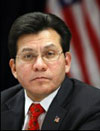| Two leading Senate Democrats called for a vote of no confidence in Attorney General Alberto R. Gonzales yesterday as political pressure for his resignation intensified in the wake of revelations about the plan to dismiss U.S. attorneys and Gonzales's role in a 2004 government crisis. Sources yesterday identified four additional prosecutors who were considered for termination, bringing to 30 the number of prosecutors who were placed on Justice Department firing lists between February 2005 and December 2006. That accounts for about a third of the nation's 93 U.S. attorney positions. Nine were fired last year. Hoping to pounce on Gonzales's sagging support among Senate Republicans, Sens. Charles E. Schumer (D-N.Y.) and Dianne Feinstein (D-Calif.) said they will offer the no-confidence resolution on the Senate floor as early as next week. The resolution would have no force of law, but Democrats hope it would raise the political stakes for Gonzales and for Republicans who vote to support him. "Any faith that he can run or manage the department is gone," Schumer said. "It's going to be very surprising if we get fewer than 60 votes." Gonzales continued to lose backing yesterday among GOP lawmakers as Norm Coleman (Minn.) became the sixth Senate Republican to call for his resignation. Sen. Arlen Specter (R-Pa.) predicted Gonzales will resign once Congress completes an inquiry into the firings because he is "unable to perform his duties." "I have a sense that when we finish our investigation, we may have a conclusion of the tenure of the attorney general," Specter said. Gonzales has been under siege for four months because of Justice's shifting explanations for the prosecutor dismissals last year. Documents released by the department showed the effort was based in part on their loyalty to the Bush administration and its policies. The attorney general was further damaged by testimony Tuesday from former deputy attorney general James B. Comey, who described how Gonzales, then the White House counsel, attempted to persuade then-Attorney General John D. Ashcroft to reauthorize a terrorism surveillance program while Ashcroft was in intensive care recovering from surgery. The Justice Department had deemed the secret warrantless program illegal, and Comey, as acting attorney general, refused to renew it. Comey, Ashcroft, FBI Director Robert S. Mueller III and others threatened to resign before President Bush intervened, Comey testified. Sen. Olympia Snowe (R-Maine) said Bush "should obviously seriously consider" firing Gonzales over the 2004 incident. Bush, who has strongly supported Gonzales, declined to comment yesterday on whether he ordered Gonzales and Andrew H. Card Jr., then Bush's chief of staff, to make the hospital visit. In another challenge to Gonzales yesterday, House Judiciary Committee Chairman John Conyers Jr. (D-Mich.) and subcommittee chairman Jerrold Nadler (D-N.Y.) called on the Justice Department to widen the circle of lawmakers briefed on the surveillance program. In a joint letter, they said that if the administration refuses to share information on the eavesdropping program with the Judiciary Committee, it would be "impossible" for the panel to consider any changes the administration is seeking in the wiretap law. The Washington Post yesterday identified 26 U.S. attorneys included on firing lists compiled from February 2005 to December 2006 by D. Kyle Sampson, then Gonzales's chief of staff, and his colleagues. Sources yesterday identified four other current or former U.S. attorneys included on a Jan. 1 list that grouped a dozen prosecutors into three tiers. They include current U.S. Attorneys Matthew Mead of Wyoming and Eric Melgren of Kansas and former prosecutors James K. Vines of Nashville and Michael G. Heavican of Nebraska. None responded to requests for comment yesterday. The four names did not reappear on any of Sampson's other lists, according to the sources, who are familiar with the documents, which have been withheld from the public. The same Jan. 1 list includes U.S. Attorney Christopher J. Christie of New Jersey, who also appears on a Nov. 1 list, sources said. Several prosecutors considered for termination said in interviews that they had received no complaints about their performance and did not know why Sampson included them. His attorney declined to comment. U.S. Attorney Gregory Miller of Tallahassee, who appeared on three lists between February 2005 and November 2006, said he has 17 years as a career prosecutor. "I have no idea why Kyle put me there," Miller said. "I would note that, although I am on his list, Kyle is no longer with the department and I still am." Two U.S. attorneys placed on a Nov. 1 list said yesterday that they received apologetic telephone calls in March from the official who assembled it, Michael J. Elston, chief of staff to the deputy attorney general. On Wednesday, Christie described a similar call. Colm F. Connolly, the chief federal prosecutor in Delaware, said Elston called "to inform me that there was an e-mail that was going to be turned over to Congress and, although it was not to be disclosed publicly, often times Congress would leak things and this could be public at some point." Connolly said he "expressed disappointment" and asked how the e-mail was prepared. He said Elston told him "that there was this firing process in the works at the time, and he had been asked to find out whether there were any other U.S. attorneys about whom there had been concerns." Connolly said Elston told him that he collected names by "speaking to people" but that he "could not remember who he spoke with, and he said he could not remember what the concerns were as they related to me." In Roanoke, U.S. Attorney John L. Brownlee issued a statement saying that he received a similar call from Elston on March 14 and "reported Mr. Elston's conduct" to Justice officials in Washington. Another prosecutor included in Elston's e-mail, Mary Beth Buchanan of Pittsburgh, expressed astonishment and pointed to her stints in Washington running both the Executive Office for U.S. Attorneys and, currently, the Office on Violence Against Women. One U.S. attorney, Frank Maxwell Wood of Macon, Ga., appeared on Elston's list shortly after his district appeared on an internal Justice Department document as having a voter-fraud problem. Elston's attorney, Robert N. Driscoll, said in a statement yesterday that Elston assembled the list based on other officials' concerns and was not suggesting that any of those prosecutors be fired. Elston and Sampson mutually agreed that none of the five prosecutors should be removed, he said. "To the contrary, Mike's view is that the five U.S. attorneys mentioned in the e-mail are among the department's best," Driscoll said. |










